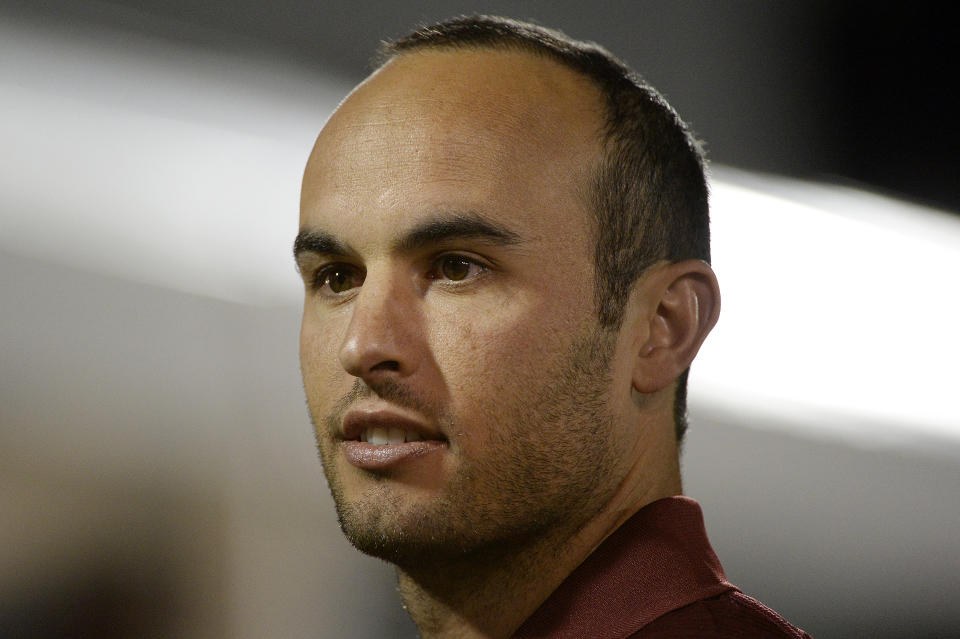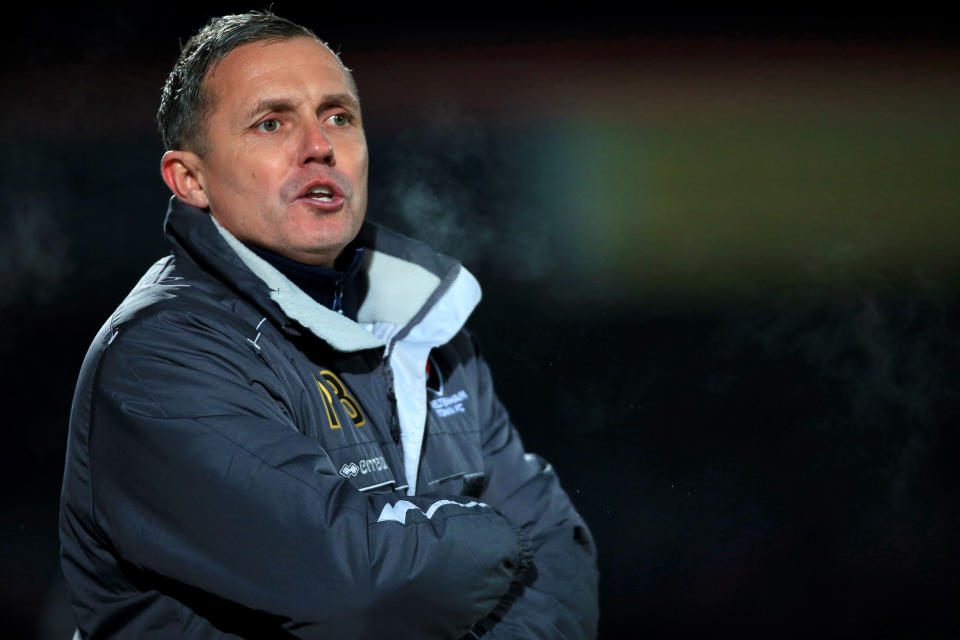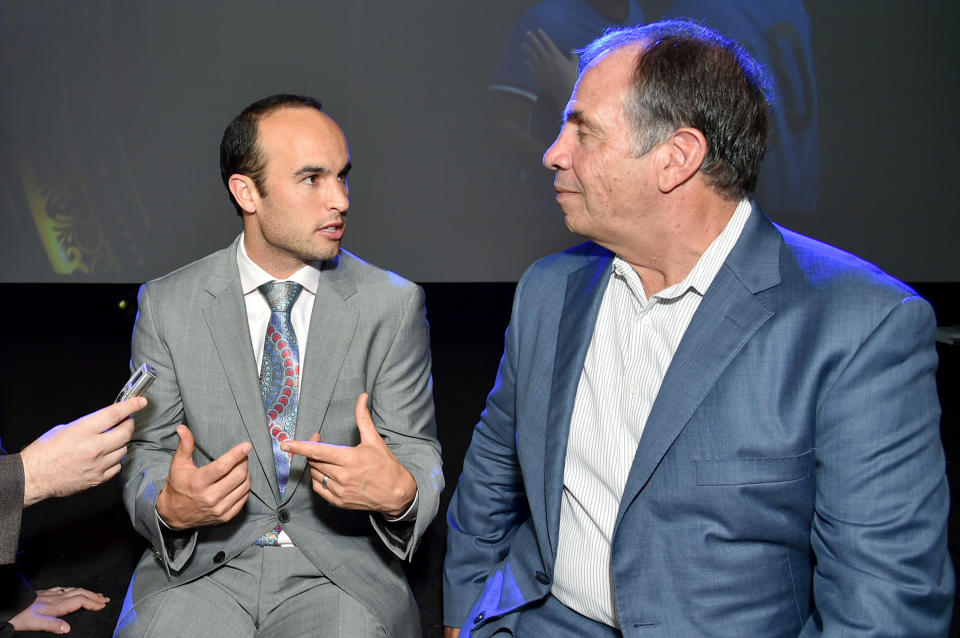'Not everyone's the star': Inside Landon Donovan's decision to coach the USL's San Diego Loyal

The cryptic text arrives out of nowhere early on a Sunday morning, around 6 a.m. PT. Landon Donovan wants to talk. He doesn’t say about what. Another comeback perhaps? “Sadly no!” he responds.
It’s unusual for an athlete to contact a reporter cold — almost always it’s the reverse — and this particular athlete happens to be arguably the greatest American soccer player of all time. But then Donovan has always been a little bit different. And as the co-owner of San Diego’s new expansion USL team in America’s second tier, it’s in his interests to use his stature to promote the project. The guess is this probably has something to do with that.
Walking into a hotel restaurant in Seattle a few days later, the 37-year-old definitely looks like he can still play. The joint-top scorer in U.S. men’s national team history (along with Clint Dempsey) was still playing as recently as a few months ago, with the indoor San Diego Sockers, which he came out of retirement for the third time to join last January. Donovan’s hair may be slightly thinner than it was a few years ago, but he doesn’t appear to have gained a pound. He sits down and, with a glass of top-shelf Scotch in his hand, begins to discuss his latest adventure.
Donovan will be introduced as San Diego Loyal’s first manager on Thursday. The news, first reported by Sports Illustrated, is surprising; throughout his magnificent, almost two-decade playing career — one that included five World Cup goals (one fewer than Lionel Messi and four more than Zlatan Ibrahimovic and Wayne Rooney combined), a record six MLS titles with the San Jose Earthquakes and LA Galaxy, and stints abroad with Bayer Leverkusen, Bayern Munich, Everton and Mexican side León — he consistently said he wasn’t especially interested in manning the sideline, at least not at the cutthroat professional level.
“I didn't want to go here and there and chase around,” Donovan told Yahoo Sports. “I have a family now.” However, as is often the case, timing and location were everything.
Why Landon Donovan will manage San Diego Loyal
Donovan has called San Diego home since shortly after hanging up his boots for the first time, in 2014. He and his wife, Hannah, are raising their young family there: sons Talon and Slate, ages 4 and 2 and a half, and daughter Raven, who was born earlier this year. He began putting roots down in the community from the start.
Before signing with the Sockers, he was involved in a bid to bring an MLS expansion team to the Southern California city of 1.4 million. When that fell through, he turned his attention to the fast-growing USL, partnering with Sacramento Republic founder Warren Smith to establish a franchise that will launch in the USL next year.
“I think when I had kids, my mentality changed,” he said. “I come from a family of teachers. And so, more than coaching or managing, I really like teaching and helping people sort of get to the next step.”
The original plan was to have Donovan serve only as the executive vice president of soccer ops, basically the general manager role. He’d be tasked with finding and signing players, plus hiring the entire coaching and support staff. In the back of his mind, though, the idea of leading the team himself lingered. So he quietly started seeking out the advice of people from across the American soccer landscape, particularly those who knew the lay of the land in the lower divisions.
Only then did the enormity of juggling both roles become apparent. “I was naive at first thinking I'd like to kind of run the soccer side and be the coach,” he admitted. Still, he was undeterred. Some of the best guidance he received was from Paul Buckle, an English soccer lifer (and the husband of NBC Sports host Rebecca Lowe) who had worn both hats working under Smith with the now MLS-bound Republic.
“It’s a massive job because it’s a brand new club. You can’t underestimate that,” said Buckle, who the Loyal have retained as an adviser. “But Landon is a brilliant listener, and he’s shown already a huge work ethic. I can see the drive in him to be the very best coach he can be.”

Buckle’s strongest recommendation was that Donovan surround himself with people who could help keep the workload manageable. “Landon wants to get everything done now, and there’s a strength in that,” he said. “But he does need to spend time with the family. And he does need to stay fresh. The only way you can do that is if you have a staff you can lean on.”
Carrie Taylor, believed to be the first female coach of an American men’s pro soccer team, will serve as one of Donovan’s assistants. The novelty had nothing to do with it. “Carrie is the most qualified person on our staff,” Donovan said of Taylor, who holds an “A” coaching license from U.S. Soccer. (Donovan is working on his “B” license, which he expects to receive next month.)
He’s in the process of hiring another assistant, and considered sounding out recently retired former U.S. teammate DaMarcus Beasley as his top deputy before determining that someone with more experience to counterbalance his lack of it would be a better fit.
Landon Donovan’s managerial style
So what kind of manger will Donovan be?
“I don't envision myself running every training session by myself à la Pep [Guardiola] or Jurgen Klopp, who are very hands on,” he said. Instead, his approach will be more Sir Alex Ferguson, who preferred to delegate that responsibility so he could watch with an eagle eye and make corrections when necessary. “For me, there's more benefit in stepping back and seeing the big picture,” Donovan said. “That's what I was good at as a player. I knew what to do, where to be. I don't know how to coach that.”
At least initially, the quality that could help Donovan most is his humanity. While his ambition was often questioned for spending the bulk of his career in MLS, his decency has never been in doubt. Donovan has always had soul. “He has a great interest in people, and he’s a really good person,” said New England Revolution coach Bruce Arena, Donovan’s boss for 14 years, first with the national team and then the Galaxy. “I never would’ve thought Landon would be a coach, but it wouldn’t surprise me if he’s good at it.” (Donovan joked that Arena thinks he’s crazy for taking the leap.)
“I don’t think I ever had a better teammate than Landon,” said Todd Dunivant, who spent 11 seasons alongside Donovan in San Jose and Los Angeles. “He’s going to be a really good man-manager, and at the end of the day, that’s what the job’s all about.”

Now Sacramento’s GM, Dunivant recalled how on flights home after away games, Donovan routinely gave his first-class seat to a young player earning a fraction of his seven-figure salary.
“What that did for team morale, it’s one small glimpse into why he won six championships,” Dunivant said. “It wasn’t just because he was a great player who could carry teams. He made others around him better. And as a coach, I think those same attributes are going to carry him far.”
So could his sincerity.
“One thing that I think is probably most important at the professional level is communication,” Donovan said. “Players would always say, I don't care if I'm not starting, or I'm not in the 18, or you want to cut me. Just tell me to my face and be honest.
“So many coaches dance around it and in the end you get resentment because of that. And so what I want to be is direct and honest but with compassion, understanding that this is their livelihood. Especially at the USL level, [if] you're making 30 grand a year, it's a big deal if you're not starting if you have a $500 bonus.”
It’s fair to wonder how Donovan will relate to players who are far beneath the level he was at the same age. Donovan had played in the Champions League and in two World Cups by 24. But he also won’t ever forget the devastation of getting left of the U.S. team that reached the knockout stage at Brazil 2014 by then-coach Jurgen Klinsmann.
The fact that Donovan was an elite player “means nothing, except that you have credibility and respect initially,” he said. “You can lose that really fast.”
Without naming him, he mentions the experience of working under former Ballon d’Or winner Ruud Gullit in L.A. “He was a terrible, terrible coach. Terrible. Maybe the worst I had. So it doesn't mean anything.”
“Being aware of that is the starting point,” he continued. “And then the second piece is, and this is just crazy the way the world works, as painful and as hard as 2014 was, it gave me compassion that I never had before. It allowed me to see that not everyone makes the team. Not everyone's the star, people get cut or don't make the roster. Being able to go to someone and say, ‘I know what that's like’ and not, ‘Oh, that must suck,’ is so valuable.”
Landon Donovan has ‘the big picture in mind’
There’s a chance it doesn’t work out, of course. That Donovan isn’t built for coaching, or that he doesn’t like it. Donovan has soul, but it’s a restless one. “If you track what he’s done since he [first] retired, he’s been looking for something. He’s been bored. He can’t get away from the sport,” Arena said.
What happens if things go sideways?
“The beauty of being in this position — although in some ways you could say it's really awkward to be an executive and an owner and a coach — is that I have the big picture in mind,” Donovan said.
There are some distinct advantages. He won’t have to worry about his job security, for one. Won’t be tempted to push a player though an injury just to get a result. He’ll have the luxury of sticking with a young striker who isn’t scoring but is playing well otherwise, he said, rather than benching him and potentially stunting his development (and the chance to eventually sell that player for profit to MLS or a foreign league).
“And if we're bad, and I'm really bad at this, I’ll step out of the way,” Donovan said. “And it would hurt. But if I'm not good at it, I shouldn't be doing it. That's just the reality. And I have no issue with that.”
There’s only one way to know if he’s capable. “When you’re starting out, you’re not always sure who you are as a coach and as a leader,” said former U.S. World Cup teammate and longtime D.C. United manager Ben Olsen, who was thrust into the hot seat on an interim basis less than a year after retiring in 2010 — and has been there ever since. “Sometimes you have to jump in to figure that out.”
Donovan seems to understand that it will be a formidable challenge. But in a way, he also sees it as an extension of what he’s already been doing on a daily basis. Raising three young children is a 24/7 job in itself.
“Every day with your kids, you're managing and coaching them. And you're teaching them,” he said. “You're being very deliberate about what you say, how and when you say it. I don't always get it right. Sometimes I blow up. But you try to be very intentional with your words. I like that. That's fun for me, to see them connect with something you say in a real way.
“Now I have the opportunity to do it to 25 young people, not just these three at home.”
More from Yahoo Sports:

